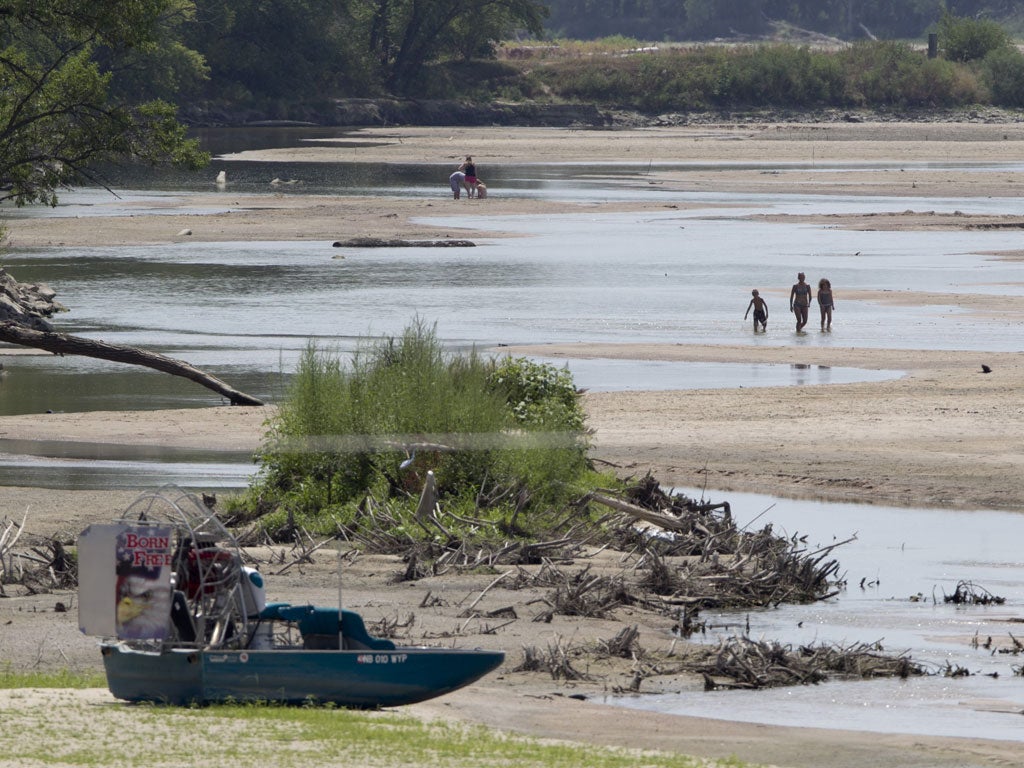Heatwave turns America's waterways into rivers of death
Falling water levels are killing fish and harming exports

The cruel summer heat-wave that continues to scorch agricultural crops across much of the United States and which is prompting comparisons with the severe droughts of the 1930s and 1950s is also leading to record-breaking water temperatures in rivers and streams, including the Mississippi, as well as fast-falling navigation levels.
While in the northern reaches of the Mississippi, near Moline in Illinois, the temperature touched 90 degrees last week – warmer than the Gulf of Mexico around the Florida Keys – towards the river's southern reaches the US Army Corps of Engineers is dredging around the clock to try to keep barges from grounding as water levels dive.
For scientists the impact of a long, hot summer that has plunged more than two-thirds of the country into drought conditions – sometimes extreme – has been particularly striking in the Great Lakes. According to the Great Lakes Environmental Research Laboratory, all are experiencing unusual spikes in water temperature this year. It is especially the case for Lake Superior, the northernmost, the deepest, and therefore the coolest.
"It's pretty safe to say that what we're seeing here is the warmest that we've seen in Lake Superior in a century," said Jay Austin, a professor at the University of Minnesota at Duluth. The average temperature recorded for the lake last week was 68F (20C). That compares with 56F (13C) at this time last year.
It is a boon to shoreline residents who are finding normally chilly waters suddenly inviting for a dip. But the warming of the rivers, in particular, is taking a harsh toll on fish, which are dying in increasingly large numbers. Significant tolls of fresh-water species, from pike to trout, have been reported, most frequently in the Midwest.
"Most problems occur in ponds that are not deep enough for fish to retreat to cooler and more oxygen-rich water," said Jake Allman of the Missouri Department of Conservation. "Hot water holds less oxygen than cool water. Shallow ponds get warmer than deeper ponds, and with little rain, area ponds are becoming shallower by the day. Evaporation rates are up to 11 inches per month in these conditions."
In some instances, fish are simply left high and dry as rivers dry up entirely. It is the case of the normally rushing River Platte which has simply petered out over a 100-mile stretch in Nebraska, large parts of which are now federal disaster areas contending with so-called "exceptional drought" conditions.
"This is the worst I've ever seen it, and I've been on the river since I was a pup," Dan Kneifel, owner of Geno's Bait and Tackle Shop, told TheOmahaChannel.com. "The river was full of fish, and to see them all die is a travesty."
As water levels in the Mississippi ebb, so barge operators are forced to offload cargo to keep their vessels moving. About 60 per cent of exported US corn is conveyed by the Mississippi, which is now 12ft below normal levels in some stretches. Navigation on the Mississippi has not been so severely threatened since the 1988 drought in the US. Few forget, meanwhile, that last summer towns up and down the Mississippi were battling flooding.
One welcome side-effect, however, is data showing that the so-called "dead zone" in the Gulf of Mexico around the Mississippi estuary is far less extensive this summer because the lack of rain and the slow running of the water has led to much less nitrate being washed off farmland and into the system than in normal years. The phenomenon occurs because the nitrates feed blooms of algae in Gulf waters which then decompose, stripping the water of oxygen.
Join our commenting forum
Join thought-provoking conversations, follow other Independent readers and see their replies
Comments
Bookmark popover
Removed from bookmarks